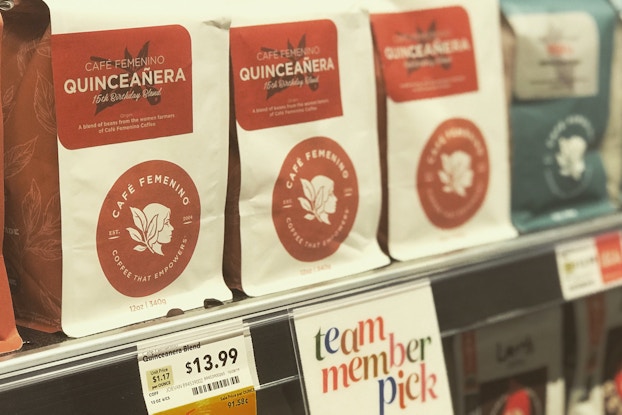
Three tips for breaking into big retail:
- Startup brands that landed distribution at national brick-and-mortar chains advise newbies to first build their own brand DNA online and cultivate a following with the help of bloggers to subscription services to grow a bona fide DTC business.
- Newbies eyeing retail placement should research a merchant’s products and practices, in part by developing relationships with staff at the local store level.
- Startups should also make sure their brand fills a meaningful void in a retailer’s existing product assortment.
The internet undoubtedly changed the game for consumer goods startups, granting entrepreneurs a turnkey selling platform to reach a mass audience directly, while toppling longstanding barriers to entry: Businesses no longer had to rely on store placement to get their goods in front of customers.
But one truism remains: Stores are still the thing. At $4.8 trillion in U.S. sales, brick-and-mortar merchants still boast the lion’s share of the U.S. retail market, accounting for 85.8% of total retail sales in 2020, according to eMarketer data. And while e-commerce sales are growing at a faster clip than store sales, online sales still accounted for just 14.2%, or $799.2 billion, of total U.S. retail last year.

Interested in a small business membership?
Find out how the U.S. Chamber of Commerce can help your company grow and thrive in today's rapidly-evolving business environment. Connect with our team to learn how a small business membership can benefit your bottom line and help you achieve your goals.
Nascent brands know this, too. That’s why, for a startup, landing the shelves of a Target or a Whole Foods or a Nordstrom can mean moving into retail’s major leagues, granting newbie brands exposure to a national consumer audience and potential distribution in hundreds, sometimes thousands, of stores to achieve scale.
But when it comes to making the leap from the small (e-commerce) screen to the big aisles of retail, there’s no easy formula.
Here’s a behind-the-scenes look at how startups Raised Real, beauty retailer Luxie and Café Femenino Coffee strategized their way into Target, Nordstrom and Whole Foods’ retail doors.
Starting as a DTC brand and having a community form around the brand on social channels was definitely a good way to get their attention.Santiago Merea, CEO and co-founder, Raised Real
Raised Real on breaking into Target: ‘I guess being innovative and doing something incredibly different from everything else out there paid off’
Organic and plant-based baby and toddler food subscription brand Raised Real first pitched Target through a brokerage firm, which represents brands to retailers. But as the brand was already on Target’s radar, it instantly scored a meeting with the retailer. “Starting as a DTC brand and having a community form around the brand on social channels was definitely a good way to get their attention,” Santiago Merea, CEO and co-founder, told CO—. “Our product is very different, too; and that helps, as we are not competing with well established brands.”
Indeed, Raised Real says it’s on a mission to set little ones on a lifelong healthy eating path with organic food that’s flash-frozen to preserve nutrients, and that’s not a me-too brand. That all appealed to Target and aligns with the buying preferences of the parents who shop the cheap-chic discounter, Merea said.
“They understand that millennial parents are looking for a clean label, veggie first, flavorful offering and they quickly identified Raised Real as a brand that was hitting on all those attributes,” he said. “I guess being innovative and doing something incredibly different from everything else out there paid off for this small brand. We were never focused on developing a ‘better for you’ version of what was already out there, but instead a ‘best for you’ product that parents can feel great about.”
RaisedReal hits all Super Targets nationwide in mid-May.
Tip for startups eyeing national retail: Give them ‘a ton of reasons to bring you in’
Startups seeking distribution at a national chain should first take note that retailers are tightening their product assortments, Merea said. “Things are tough right now, as many retailers are consolidating SKUs. So now more than ever, make sure that your offering is truly differentiated and not just a slight improvement on an established product with a nicer DTC-looking brand,” he said. Indeed, just because DTC brands — from Harry’s shaving products to Casper mattresses — have carved a niche at Target, that alone “is not going to cut it right now,” he said. “They need to have a ton of reasons to bring you in.”
Make sure your brand is additive to the product-category lineup in a retailer’s mix. “This was huge for us,” Merea said. “Some startups are too focused on competition, when they should be looking at how they can make the [merchandise] set better.”
[See 10 startups with strong brand identities.]

Luxie on partnering with Nordstrom: Showing up with ‘two suitcases full of samples’
Getting a foot in big-retail’s door sometimes starts with just showing up, even when you might not be invited. That’s what Conor Riley, CEO of beauty brand Luxie did, but not before first building a brand and consumer following DTC-style.
As Riley sees it, Luxie’s DNA is unique among prestige beauty brands. While the DTC brand offers high-performance, professional grade beauty tools, “we work hard to build a community that is inclusive, concerned about sustainability, and strives to make a positive impact,” he said. “These core values are incredibly important as consumers want to align with brands in a whole new way. It's more than just lip service.”
To get the attention of big brick-and-mortar retailers, the brand made a bold push via Instagram bloggers, key collaborations with YouTubers like Jadey Wadey, and influencers from Kylie Jenner to beauty subscription box services such as Ipsy and FabFitFun.
Nordstrom, in particular, “was the store we wanted to be in,” Riley said. “So I flew to Seattle and waited in the Starbucks, which is in the lobby of their headquarters.
“I had told the buyers that I was coming and would be downstairs. I only needed 15 minutes and would be fine chatting over coffee. It was nerve-wracking lugging those suitcases into Starbucks, but so much relief when they sat down with me,” Riley said. “I gave them a ton of product, and sure enough, a week later got the call.”
Nordstrom, it turns out, coveted the audience Luxie had already won over. “I think what really helped was our core DNA attracts a digitally native consumer who might not be shopping these retailers, so bringing us in was a net positive for everyone.”
Luxie started selling through Nordstrom in 2017, Anthropologie in 2018, Macy's in 2019 and Lord & Taylor in 2021.
“We continue to grow our list of retail partners and use our social media to not just drive awareness, but also help our retailers sell through our product,” Riley said.
Tip for breaking into big retail: ‘Be part of the solution’
It’s a long and difficult journey to land in retail, Riley said. “But Luxie did it by building strong relationships with our retailers—walking the floor, talking to them about placement and understanding their business,” he said. “We encouraged their input on product, price and positioning. This brought those retailers into our world and they became collaborators and partners rather than simply customers. My advice for anyone looking to get into retail would be to have some very in-depth conversations about what those retailers are specifically dealing with and how you can be part of the solution.”
[More here on building an online business that drives sales.]

Café Femenino on landing Whole Foods: ‘The pitch wasn’t as much about our product as it was about what makes Whole Foods so unique’
Café Femenino forged the path to big retail via Whole Foods’ own “local and category foragers,” who first vetted the brand to see if it aligned with the grocery chain’s business needs, Lane Mitchell, director of marketing and business development, told CO—.
The brand passed muster. So, in 2019, a meeting between the grocer and Joe Van Gogh, the company that roasts and distributes the coffee brand, was in the books, she said.
When Mitchell and the Café Femenino team met with the Whole Foods buyer — “7 p.m. on a Sunday night at a small restaurant, where we all ordered a Cobb salad and an iced tea”— the discussion was more about absorbing the retailer’s purpose-driven culture and goals than the startup’s origin story, which is precisely what was needed, she said.
“The pitch wasn’t as much about our product as it was about what makes Whole Foods so unique. Understanding the retailer’s business goals and the role our product line can play in helping them achieve those goals was critical to getting our foot in the door,” Mitchell said. “This takes a great deal of research developed over many years on the retailer, which starts by developing relationships at the local store level, as well as a realistic assessment of the category and competitive set.”
Turns out Whole Foods found a kindred spirit in Café Femenino’s model, whereby coffee is ethically sourced by women farmers across the globe—providing them direct compensation as well as economic benefits like legal rights to the land on which them farm, leadership roles and financial decision-making power.
“The meeting was so early in the process that we didn’t have samples to leave,” Mitchell recalled. “So, we left him with Photoshop mockups of the product line and information on our mission to empower women at the heart of coffee. We were fortunate that the buyer has an exceptionally rich understanding of the specialty coffee supply chain. Our coffee was a perfect fit. Three months later, we were on the shelves.”
Whole Foods saw Café Femenino as a tool to communicate their purpose to its partners, customers, communities and each other, Mitchell said, “as well as increase category sales among their target customers.”
The date of the meeting proved fortuitous. “It was good timing,” Mitchell said. “The request aligned to the schedule of a category reset.”
Café Femenino has since expanded to retailers including Williams-Sonoma, as well as the digital grocery shelves of Kroger, Ralphs, Fred Meyer and more.
Tip for startups eyeing national retail: Get to know the retail team at your local store
For food startups looking to break into a national grocer, local and category “foragers” can serve as invaluable advocates, Mitchell said. “If you can, spend time in a store and get to know the team there. Most chains like Whole Foods have local foragers or category foragers who specialize in identifying emerging brands and trends. Try to find them early, as they can help you understand your product within the competitive set. Be sure you understand your product’s role on the shelf.”
CO— aims to bring you inspiration from leading respected experts. However, before making any business decision, you should consult a professional who can advise you based on your individual situation.
Follow us on Instagram for more expert tips & business owners stories.
CO—is committed to helping you start, run and grow your small business. Learn more about the benefits of small business membership in the U.S. Chamber of Commerce, here.







